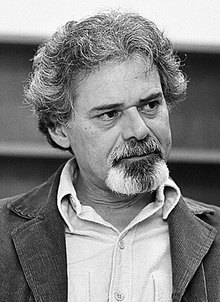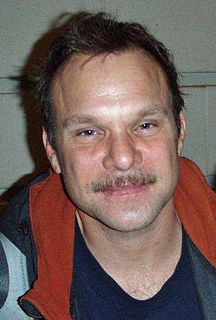A Quote by Michael Ondaatje
What he would say, he cannot say to this woman whose openness is like a wound, whose youth is not mortal yet. He cannot alter what he loves most in her, her lack of compromise, where the romance of the poems she loves still sits with ease in the real world. Outside these qualities he knows there is no order in the world.
Related Quotes
The postmodern reply to the modern consists of recognizing that the past, since it cannot really be destroyed, because its destruction leads to silence, must be revisited: but with irony, not innocently. I think of the postmodern attitude as that of a man who loves a very cultivated woman and knows he cannot say to her, I love you madly, because he knows that she knows (and that she knows that he knows) that these words have already been written by Barbara Cartland. Still, there is a solution. He can say, As Barbara Cartland would put it, I love you madly.
Love is an immortal wound that cannot be closed up. A person loses something, a part of her soul, when she loves someone. And she goes about looking for that lost part of her soul, for she knows that otherwise she is incomplete and cannot be at rest. It is only when she is with the person she loves that she becomes complete again in herself; but the moment he leaves, she loses that part which he has taken with him and knows no rest till she has found him once more.
Chloë Moretz as Carrie has an inherent amount of charisma, the camera loves her, she's been acting since she's five, she's a total pro, she knows her instrument. I took her on this phenomenal journey from a confident child star who has the great privileges of a family who loves her, great success, and huge confidence, to a wounded woman who had to gain her confidence back and desperately wanted love and acceptance.
She loves you," the Prince cried. "She loves you still and you love her, so think of that--think of this too: in all this world, you might have been happy, genuinely happy. Not one couple in a century has that chance, not really, no matter what the storybooks say, but you could have had it, and so, I would think, no one will ever suffer a loss as great as you.
Do you suppose a woman knows why she loves? Does she select? Does she say to herself, 'Go to! here is a distinguished statesman with presidential possibilities; I shall proceed to fall in love with him.' or, 'I shall set my heart upon this musician, whose fame is on every tongue?' or 'this financier, who controls the world's money markets?'
A woman will test you to see if you are what you say you are. Any woman that you fall in love with: She loves you too, but she's going to try you; that's her nature. She has to know that she can depend on you; she has to know that you will stand up for her. She has to know that you will back up the children that she brings in the world for us.
So she had to satisfy herself with the idea of love - loving the loving of things whose existence she didn't care at all about. Love itself became the object of her love. She loved herself in love, she loved loving love, as love loves loving, and was able, in that way, to reconcile herself with a world that fell so short of what she would have hoped for. It was not the world that was the great and saving lie, but her willingness to make it beautiful and fair, to live a once-removed life, in a world once-removed from the one in which everyone else seemed to exist.
For a woman ... to explore and express the fullness of her sexuality, her ambitions, her emotional and intellectual capacities, her social duties, her tender virtues, would entail who knows what risks and who knows what truly revolutionary alteration to the social conditions that demean and constrain her. Or she may go on trying to fit herself into the order of the world and thereby consign herself forever to the bondage of some stereotype of normal femininity - a perversion, if you will.
And she [Eleanor Roosevelt]loves being a star. And she loves being a teacher and a leader and a mentor and a big friend. Also, she's tall. She's one of the tallest girls in the school. And she's an athlete. And she writes many years later, at the end of her life, she writes that the happiest day, the happiest single day of her life was the day that she made the first team at field hockey. And I have to say, as a biographer, that's the most important fact. I
Pride measures prosperity not by her own advantages but by the disadvantages of others. She would not even wish to be a goddess unless there were some wretches left whom she could order about and lord it over, whose misery would make her happiness seem all the more extraordinary, whose poverty can be tormented and exacerbated by a display of her wealth. This infernal serpent, pervading the human heart, keeps men from reforming their lives, holding them back like a suckfish.
If you are her man, she will talk to you until there just aren’t any more words left to say, encourage you when you’re at rock bottom and think there just isn’t any way out, hold you in her arms when you’re sick, and laugh with you when you’re up. And if you’re her man and that woman loves you—I mean really loves you?—she will shine you up when you’re dusty, encourage you when you’re down, defend you even when she’s not so sure you were right, and hang on your every word, even when you’re not saying anything worth listening to.
For a mother the project of raising a boy is the most fulfilling project she can hope for. She can watch him, as a child, play the games she was not allowed to play; she can invest in him her ideas, aspirations, ambitions, and values - or whatever she has left of them; she can watch her son, who came from her flesh and whose life was sustained by her work and devotion, embody her in the world. So while the project of raising a boy is fraught with ambivalence and leads inevitably to bitterness, it is the only project that allows a woman to be - to be through her son, to live through her son.







































